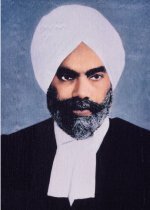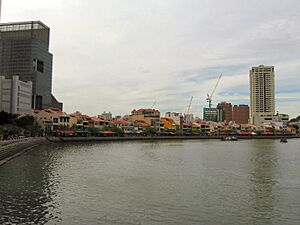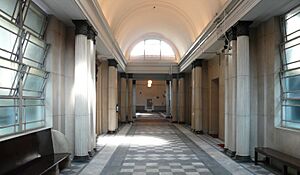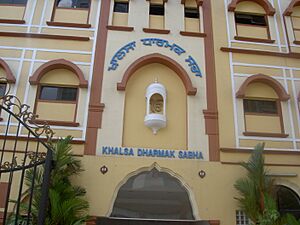Choor Singh facts for kids
Quick facts for kids
Choor Singh
|
|
|---|---|
 |
|
| Judge of the Supreme Court of Singapore | |
| In office 28 August 1963 – 30 November 1980 |
|
| Personal details | |
| Born |
Choor Singh Sidhu
19 January 1911 Kotteh, Punjab, British India |
| Died | 31 March 2009 (aged 98) Singapore |
| Nationality | Singaporean |
| Alma mater | University of London |
| Committees | Co-founder, patron and honorary chairman, board of trustees, Singapore Khalsa Association |
Choor Singh Sidhu (born 19 January 1911 – died 31 March 2009), known as Choor Singh, was a famous Singaporean lawyer. He became a judge in the highest court of Singapore, the Supreme Court of Singapore. After he retired, he became well-known for helping others and writing books about Sikhism.
Choor Singh was born in a simple family in Punjab, India. He moved to Singapore when he was four years old. He worked very hard in school and finished his secondary education at Raffles Institution. Before becoming a judge, he worked as a clerk in a law firm. He also worked for the government, helping with legal matters.
A senior colleague encouraged him to study law. Choor Singh studied on his own and passed many exams from the University of London. In 1948, he became a coroner, who investigates deaths. The next year, he became a magistrate, which is a judge who handles smaller cases. He was the first Indian person to hold this job in Malaya (which included Singapore back then). He later studied law in England and became a Barrister-at-Law in 1955. He became a district judge in 1960 and a Supreme Court judge in 1963.
After retiring in 1980, Choor Singh continued to be very active in the Indian and Sikh communities. He helped start the Singapore Khalsa Association in 1931. He also supported many educational charities and wrote several books about Sikhism. In 1994, the Sikh community honored him by asking him to lay the foundation stone for a new temple building.
Early Life and Education

Choor Singh Sidhu was born in Kotteh, Punjab, India, on 19 January 1911. When he was four years old, he moved to Singapore with his mother and sister. They joined his father, who worked as a night watchman. His father worked in a godown near Boat Quay by the Singapore River.
Choor Singh went to Pearl's Hill Primary School and Outram Road School. He often walked 5 kilometers (about 3 miles) to school. He sometimes slept outside and studied under street lamps at night. He finished his secondary education at Raffles Institution in 1929. He was in the top class and was classmates with David Marshall, who later became Singapore's first Chief Minister. They became good friends.
After school, it was hard to find a job because of the Great Depression. From 1930 to 1934, he was unemployed. Later, he worked for three years as a clerk in a law firm. He earned 20 Straits dollars a month. Then, he joined the government and worked in the Official Assignee's office. This office managed the money and property of people who were bankrupt.
His boss, James Walter Davy Ambrose, encouraged him to study law. Choor Singh read law books in his free time. He planned to save money to study law in England. But the rules changed, and he could study from Singapore. He enrolled as an external student at the University of London. He passed his exams, including the intermediate law exam in 1948.
On 20 May 1948, he became a coroner. In December 1949, Choor Singh became a magistrate. This made him the first Indian person to be a magistrate in colonial Malaya. He continued his law studies at Gray's Inn in England. He traveled there several times and became a Barrister-at-Law in 1955. In 1958, he joined a special board that dealt with public security.
Choor Singh also helped found the Sri Guru Nanak Sat Sang Sabha in 1953. This group built the Gurdwara Sri Guru Nanak Satsang Sabha in Katong in 1969.
Working as a Judge
On 11 July 1960, Choor Singh became a district judge. He also wrote a book called Gaming in Malaya that year. On 28 August 1963, he was appointed a judge of the Supreme Court.
Choor Singh worked as a judge for 17 years. During this time, 105 of his judgments were officially recorded. He handled many important and serious legal cases. He was the first judge in Singapore to make a specific legal decision involving a woman in a very serious case in 1970. In an interview later, he said he was confident he had always done his duty fairly. All five of his judgments that went to the highest court at the time were confirmed as correct.
He also heard other significant cases, including those involving serious crimes. In these cases, he carefully reviewed the evidence and made his decisions based on the law.
Choor Singh once shared a story about a trial he presided over. This trial led to a big change in how criminal cases were handled in Singapore. Before 1969, some serious cases used a jury, which is a group of citizens who decide if someone is guilty. After this particular trial, the Prime Minister, Lee Kuan Yew, decided to remove jury trials for criminal cases. This was because of concerns about how juries made their decisions. Choor Singh's experience helped the Prime Minister make this important change.
From 1967 to 1979, Choor Singh also worked as a Commissioner for land acquisition appeals. He retired as a judge on 30 November 1980.
Later Years and Community Work
After retiring, Choor Singh stayed busy. For about four and a half years, he worked as a personal consultant for the Chairman of the Oversea-Chinese Banking Corporation (OCBC) and other companies. He also chaired the Probation Committee, which helps supervise probation officers. He was also vice-president of the National Kidney Foundation Singapore. He was a member of the Presidential Council for Minority Rights, which works to protect the rights of different groups in Singapore.
Choor Singh enjoyed playing cricket when he was younger. Later, he learned to play golf and enjoyed gardening. He remained very involved with the Indian and Sikh communities. He was one of the young Sikhs who founded the Singapore Khalsa Association in 1931. He served as its patron and honorary chairman. He was also a patron of the Singapore Indian Association.
He wrote several books about Sikhism. These include Bhai Maharaj Singh: Saint-soldier of the Sikh Faith (1991), The Sikh Gurus (1991), Understanding Sikhism (1994), and Who is a Sikh? (2004). A writer named Dr. Kirpal Singh praised Choor Singh's books for being simple and honest.
Choor Singh believed learning was very important. He supported Sikh educational charities and other educational causes. He was a trustee of the Singapore Sikh Education Foundation. This foundation was started in 1990 to teach the Punjabi language to children. He was also a life member of the Singapore Indian Education Trust. This trust helps Singaporean Indians with money for their education. As Chairman of the Sikh Advisory Board, he convinced the government to let schools be used for Punjabi classes. About 400 Sikh children attended these classes on Saturday mornings.
On 18 January 1999, just before his 88th birthday, Choor Singh donated S$25,000 to the National Institute of Education. Part of this money was used to create the Justice Choor Singh Gold Medal. This award goes to the best student teacher in education studies. The rest of the money funded research on the Sikh community's contributions to education. In 2001, he donated S$140,000 to the Singapore Management University.
The Sikh community gave Choor Singh its highest honor on 14 August 1994. They invited him to lay the foundation stone for the new Gurdwara Sahib building. In August 1996, the Deputy Prime Minister Lee Hsien Loong gave him one of the first Sikh Community Service Awards. This award recognized his important contributions to the community.
Choor Singh passed away peacefully in his bed on 31 March 2009, at the age of 98. His wife, Bhagwan Kaur, had passed away in 2004. He left behind two sons and a daughter. Choor Singh was cremated after his funeral. He wrote his own epitaph, which was published after his death:
I came here by His grace
After toiling in many lower lives.
I have done my duty to my State,
To my community and my Faith.
I leave now as ordained by my fate,
To meet Him and sit at His Lotus feet.
Images for kids
 | May Edward Chinn |
 | Rebecca Cole |
 | Alexa Canady |
 | Dorothy Lavinia Brown |







